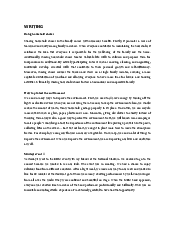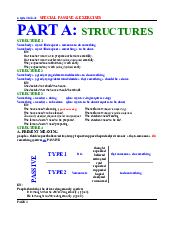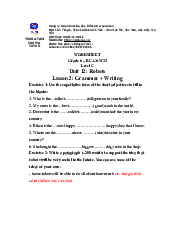





Preview text:
Read the following text and choose A, B, C or D to write on your answer sheet.
Country music is one of the most popular kinds of music in the United States today. Maybe,
country music is very popular because it is about simple but strong human feelings and events
like love, sadness, good times and bad times. It tells real life stories and sounds the way people
really talk. As life becomes more complicated and difficult, it is good to hear about simple ordinary people.
Country music is sometimes called country-western music. It comes from two kinds of music.
One is the traditional music of the people in the Appalachian Mountains in the eastern United
States. The other is traditional, cowboy music from the American West. The singers usually play
guitars or electric guitars when they sing.
Country music became very popular in the South. During World War II, thousands of people from
the South moved to the Northeast and the Midwest to work in factories. They took their music
with them. Soldiers from the rest of the country went to army camps in the South and learned to
like country music there. Slowly, it became popular all over the United States.
11. Country music is very popular because _______________________.
A. it's about strong human feelings
B. it's about events like love, sadness
C. it tells about good times, bad times D. all are correct
12. Country music is _______________________.
A. the traditional music of the people in the eastern United States
B. considered as the cowboy music from the American West
C. sometimes called country-western music
D. from two kinds of music which haven't been widely known
13. According to the passage, it's untrue to say that ____________________________.
A. Country music became very popular in the South
B. Factory workers took country music with them from the South
C. Country music was brought from the South by soldiers
D. Gradually, country music became popular all over the United States
14. The best title for the passage is _______________________________. A. Country music B. Music in the United States
C. The Formation of Country Music
D. The Benefits of Country Music
15. The singers usually play _________________________ when they sing. A. drum and violins B. guitars or electric guitars C. the music instruments D. guitars and piano
Read the following article and decide whether the statements below are True, False or Not
Given. Write T (True), F (False) and NG (Not Given) on your answer sheet.
11. Bill Prince has had several jobs. T
12. Bill writes his books in the evening. F
13. Bill shows his writing to his wife. T
14. The sheepdog was his first book. F
15. Bill prefers writing about animals to writing about people. NG
Read the following article and decide whether the statements below are True, False or Not
Given. Write T (True), F (False) and NG (Not Given) on your answer sheet.
11. John P usually works in England. T
12. A few days ago, John was on television in Japan. T
13. John hopes to become famous in England one day. NG
14. John will still work in the park because he needs the money. T
15. His wife would like him to stop singing. NG
Read the article. Then write L for Lesley, for J
James, or E for Eric on your answer sheet.
Is gossip really good for you?
That’s the question we asked some of our readers this week. Email us and tell us what you think. Lesley Hartley, age 25
‘There’s a boy in my class at university who I really like. He’s called Tony. I was too scared
to ask him out. I told my best friend Alice this secret. She said she wouldn’t tell anyone.
Alice couldn’t keep the secret, though, and she gossiped to her other friends. Of course, her
friends told Tony! Fortunately for me, the gossip was actually a good thing. Tony waited for
me after class one day. He told me that Alice’s friends had gossiped about me. And then he
invited me to go out to the cinema one night. We’ve been together since then! I think people
are probably programmed to gossip. We need to gossip to build connections with other people.’ James Goodman, age 35
‘Unfortunately, I think gossiping is in our genes. And I don’t think it’s a positive thing.
People gossip to make themselves feel more important. They don’t think about the effect it
has on the people they gossip about. For example, one of my neighbours gossiped about me
after I divorced my wife. She said that I had treated my wife badly. Another neighbour told
my work colleagues that my wife was going to move to Germany with the children. These
are both lies. I’ve found it difficult to meet someone else because people believe the gossip, not me.’ Eric French, age 28
‘We shouldn’t feel guilty about a bit of gossip. I believe that gossiping is good for you. We
are people, and people enjoy sharing news – both good and bad – so that they can form and
improve their social relationships. I’ll give you an example ... I’m quite shy and I don’t
make friends easily. My girlfriend told me that I didn’t go out enough, and that I should
have a better social life. She complained about this to her best friend, Susan. Then, one
night, I got a phone call from Danny, Susan’s boyfriend. He asked me to go out with him to
see a band. I had a brilliant night. Since then, Danny and I have seen a band every week.
He’s a good friend now and I feel much happier.’
Example: There was a boy in my class I liked. L
11. We all like gossiping. __L___
12. I’m not married any more. __J___
13. I think it’s difficult to meet someone new. __J___
14. I find it difficult to make friends. __E___
15. I didn’t ask someone out because I was scared. ___E__
The Cancer-Prone Personality Paragraph A
One of the reasons scientists think that there is a link between stress and cancer is the idea that there may be a
cancer-prone personality. The cancer-prone personality consists of a set of personality traits that are found more
frequently in people who have cancer than in those who do not. Paragraph B
What personality traits make up the cancer-prone personality? Most often, people who are polite, unaggressive,
and agreeable are said to have this type of personality. They seem to have trouble showing when they are angry.
Even in situations in which they should be angry, they appear to be calm and happy. Paragraph C
When faced with a stressful event, people with the cancer-prone personality do not show stress outwardly.
Instead, they keep their emotions bottled inside. They repress, or hide, their emotions, even from themselves. Paragraph D
The cancer-prone personality is linked to the likelihood of getting cancer, and the same personality traits seem to
help affect a cancer victim’s recovery. For example, some studies have looked at cancer patients who accept the
cancer without getting angry. These patients get sick faster and they die sooner than people who became angry at
their cancer and fight the disease. Paragraph E
However, it is important to keep in mind that some scientists interpret these research findings differently. First of
all, not everyone who has a cancer-prone personality gets cancer. And not everyone who has cancer has a cancer-
prone personality. Even more important, there is no proof that having a cancer-prone personality causes cancer. In
fact, it may be the other way around: getting cancer may cause people to develop a cancer-prone personality. Questions 1-10
Match the following words with the correct definitions 1. trait (n.) A. likely to get cancer 2. cancer-prone (adj.)
B. restrain, prevent from showing emotion or action 3. polite (adj.)
C. on or from the outside, on the surface 4. aggressive (adj.) D. respectful, well-mannered 5. agreeable (adj.) E.
understand something as a particular meaning 6. outwardly (adv.) F. a quality, a characteristic 7. repress (v.)
G. return to normal health from sickness 8. victim (n.) H. enjoyable and pleasant 9. recovery (n.) I.
a person harmed, injured or killed 10. interpret (v.) J.
likely to attack verbally or physically 1F 2A 3D 4J 5H 6C 7B 8I 9G 10E Questions 11-15
The reading passage The Cancer-Prone Personality has 5 paragraphs A-E. Choose the most suitable heading for
each paragraph from the list of headings below i. Get angry, live longer 11. Paragraph A ii. Nothing to see on the surface 12. Paragraph B iii. Try to overcome anger 13. Paragraph C iv. Which on causes which? 14. Paragraph D v. Who is likely to get cancer? 15. Paragraph E vi. Why join stress and cancer? vii. Scientists agree 11 VI 12 V 13 II 14 I 15 IV




